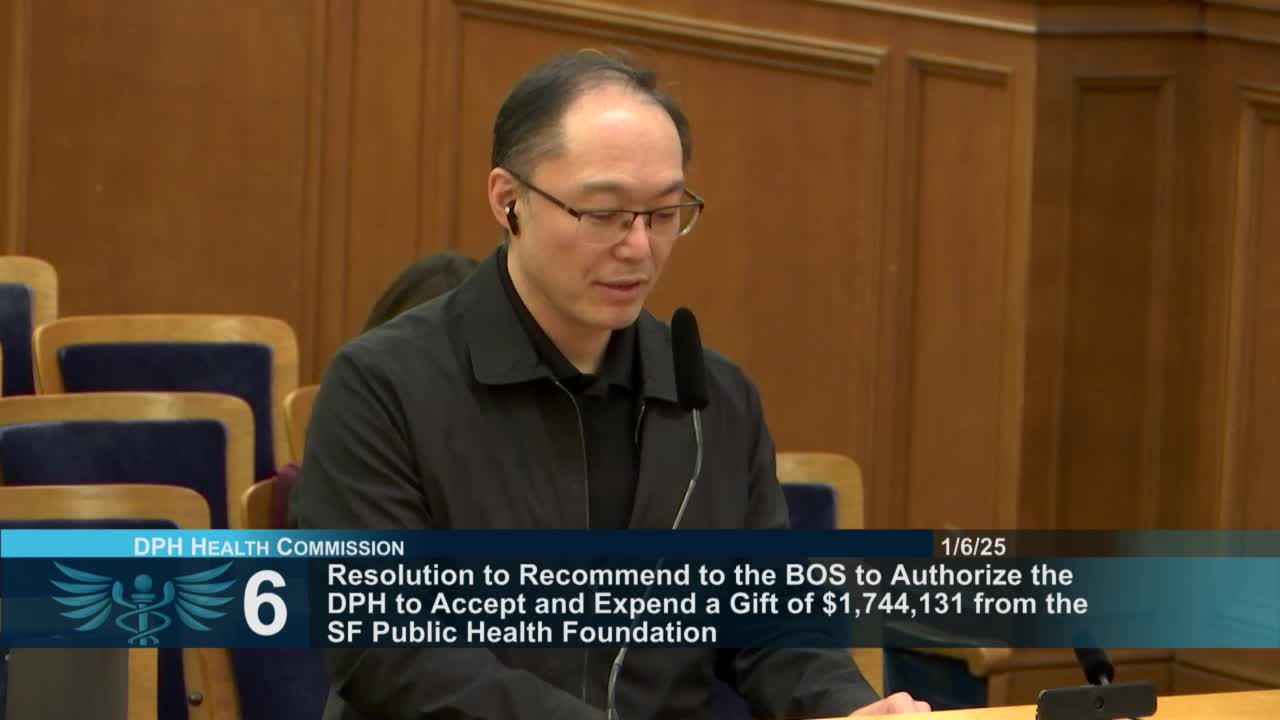DPH outlines Mental Health SF rollout and reports an estimated 20% drop in overdose deaths through Nov. 2024
Get AI-powered insights, summaries, and transcripts
Subscribe
Summary
Behavioral Health Services briefed the Health Commission on Mental Health SF implementation, expanded street-based care and treatment access, and preliminary data showing a decline in overdose deaths; the department described continuing gaps in high-acuity residential beds and plans for additional facilities and programs.
The Department of Public Health's Behavioral Health Services (BHS) presented a broad update on implementation of Mental Health SF, addiction-treatment expansions and overdose response work at the Jan. 6 Health Commission meeting.
Dr. Hilary Coonens, presenting the update, said Mental Health SF — the 2019 legislative program funded primarily by Proposition C — has expanded coordinated care, street-based services and residential capacity and has opened new access hours at clinics and pharmacies. "We have added approximately 400 new residential care and treatment beds," Coonens said, while acknowledging staffing challenges that have affected how quickly some beds have been opened and staffed.
Why it matters: Commissioners sought results and implementation detail for components of Mental Health SF (Office of Coordinated Care, Street Crisis Response Team, Mental Health Service Center and residential expansions). The department reported progress in street-based outreach, medications for opioid use disorder and crisis-response capacity, and shared preliminary data on overdose deaths.
Key program updates and data
- Service expansion: The Office of Coordinated Care now centralizes referrals and care coordination; BHS reported more than 8,500 unique individuals served in the most recent fiscal year and more than 9,000 street-team engagements with over 1,300 direct connections into services.
- New facilities and beds: Coonens said a 16-bed voluntary crisis stabilization unit is expected to open in spring at a city-acquired site (822 Geary was identified later in Q&A). She described state-funded transitional housing (approximately $35 million over four years) to support people with behavioral health needs and plans to apply for state capital funding for additional residential projects.
- Overdose response and medications: BHS reported preliminary data through November 2024 indicating the city is on track for "greater than 20% fewer deaths compared to 2023." From January–October 2024, the department recorded more than 1,300 new admissions to DPH-funded methadone clinics (a 35% increase over the same period in 2023). BHS also described a telehealth program (expanded to 16 hours, seven days a week) that facilitated nearly 1,500 telehealth visits between March and October 2024 and led to roughly 40% of callers initiating medication for opioid use disorder; when callers could be placed in a stabilization bed, treatment starts rose to about 90%.
- Buprenorphine access: The San Francisco Health Network reported that clients prescribed buprenorphine increased 59% compared with the prior year and that evening clinic hours and telehealth navigation contributed to the rise.
Oversight and safety
Coonens addressed questions about oversight of contracted substance-use providers after media reports of fatal overdoses at a treatment site. She said DPH implemented immediate actions including an investigation, increased client screening and monitoring, reduced off-site passes when appropriate, and an Agency Technical Assistance Plan requiring heightened oversight. Coonens said the provider's prior practices had exceeded state minimum requirements, and DPH is working with the provider to strengthen safety and monitoring.
Commissioner questions and next steps
Commissioners asked about workforce shortages, use of state Medi-Cal reforms (CalAIM, BH Connect) to expand billable services, and how new capital-state funding will be applied; Coonens said operating funds remain a constraint and the department is planning to use multiple revenue sources (state grants, Medi-Cal billing, local funds) to sustain new programs. Commissioners requested additional data on crisis-team response times for children and Seneca criteria; BHS agreed to provide follow-up data by email.
Ending
Commissioners and the director praised BHS for progress while noting ongoing gaps in the highest-acuity residential bed types, workforce shortages and the need for sustainable operating dollars to make capital investments effective.
